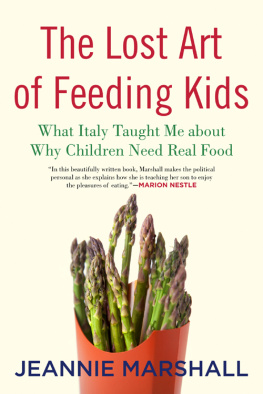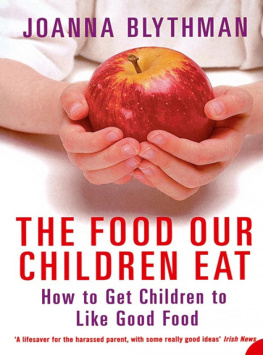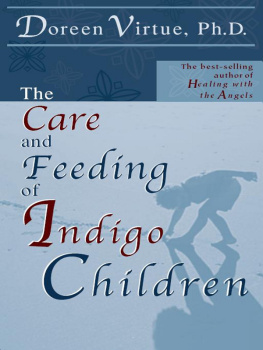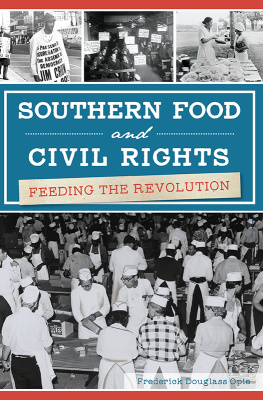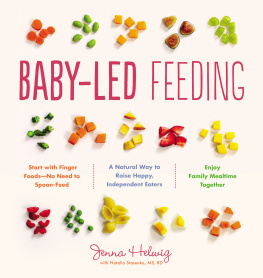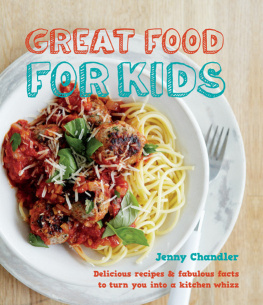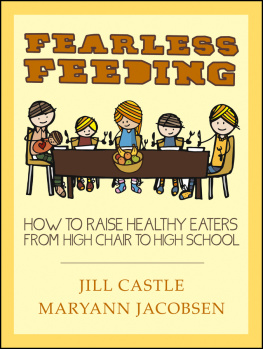Marshall - The Lost Art of Feeding Kids : What Italy Taught Me about Why Children Need Real Food
Here you can read online Marshall - The Lost Art of Feeding Kids : What Italy Taught Me about Why Children Need Real Food full text of the book (entire story) in english for free. Download pdf and epub, get meaning, cover and reviews about this ebook. City: S.l, year: 2014, publisher: Beacon Press, genre: Home and family. Description of the work, (preface) as well as reviews are available. Best literature library LitArk.com created for fans of good reading and offers a wide selection of genres:
Romance novel
Science fiction
Adventure
Detective
Science
History
Home and family
Prose
Art
Politics
Computer
Non-fiction
Religion
Business
Children
Humor
Choose a favorite category and find really read worthwhile books. Enjoy immersion in the world of imagination, feel the emotions of the characters or learn something new for yourself, make an fascinating discovery.
- Book:The Lost Art of Feeding Kids : What Italy Taught Me about Why Children Need Real Food
- Author:
- Publisher:Beacon Press
- Genre:
- Year:2014
- City:S.l
- Rating:4 / 5
- Favourites:Add to favourites
- Your mark:
- 80
- 1
- 2
- 3
- 4
- 5
The Lost Art of Feeding Kids : What Italy Taught Me about Why Children Need Real Food: summary, description and annotation
We offer to read an annotation, description, summary or preface (depends on what the author of the book "The Lost Art of Feeding Kids : What Italy Taught Me about Why Children Need Real Food" wrote himself). If you haven't found the necessary information about the book — write in the comments, we will try to find it.
Abstract: -- The Lost Art of Feeding Kids?will appeal to parents, food policy experts, and fans of great food writing alike
Marshall: author's other books
Who wrote The Lost Art of Feeding Kids : What Italy Taught Me about Why Children Need Real Food? Find out the surname, the name of the author of the book and a list of all author's works by series.
The Lost Art of Feeding Kids : What Italy Taught Me about Why Children Need Real Food — read online for free the complete book (whole text) full work
Below is the text of the book, divided by pages. System saving the place of the last page read, allows you to conveniently read the book "The Lost Art of Feeding Kids : What Italy Taught Me about Why Children Need Real Food" online for free, without having to search again every time where you left off. Put a bookmark, and you can go to the page where you finished reading at any time.
Font size:
Interval:
Bookmark:
Firstly, I have to say that it was my husband, James Heer, who urged me to stop complaining about childrens food and to start writing about it. Without his insight, I would have spent my energy ranting over the dinner table instead of redirecting it onto the page. I have been fortunate to be able to work with wonderful editors who have helped me to tell this story about food and children. Alexis Rizzuto at Beacon Press inspired me both on the page and in the kitchen. May her garden forever overflow with tomatoes. At Random House Canada, Angelika Glover and Pamela Murray helped keep my momentum going with their genuine interest in food and children. Kristin Campbell made numerous trips to the library in Toronto while I was in Rome. Stacey Cameron and Jane Gebhart gave the book a polish with their careful copy editing. Jackie Kaiser and Chris Casuccio are not only the worlds two best agents; they are also great cooks. I treasure their advice, and I am grateful for their enthusiasm.
Ive been lucky to cook with so many friends over the years. I owe a huge debt to Grainne ODonnell for showing me what is possible in the kitchen. Brenda Ferguson showed me how to eat my way around Paris more than once and then made me think I was still there when I was really in her kitchen in Toronto. Brenda Copeland taught me how to roast a leg of lamb at a crucial time in my life. I want to thank Lorraine Johnson for her friendship and her infectious interest in everything that grows. I want to thank Andrew Leyerle for taking us to dinner, at his fathers request, at Taberna de Gracchi. It was a happy time.
I have to thank my family, too, for all those memories around the dinner table: Mary Marshall, my mom, who really did know how to cook; my sister Marion Marshall, who made the strangest things taste really good; my brothers, for their belief in me: David, Danny, George, and even you, Ken, wherever you are. I also want to thank my adorable niece Kim, who knows her way around Rome; my nephew Brandon, for his sharp insight and lively e-mail correspondence; and my nephew Aaron for declaring at the end of a meal at a farmhouse in Umbria that it was one of the best experiences of his life.
In Rome, Sarah Webster and Luis Prieto, Andrea Maroni Ponti and Valeria Del Gatto, Marjorie Shaw, Maho Sato, and Raffaella Menichini have fed me, talked with me and taught me so much. Mona Talbott at the American Academy of Rome talked with me about food and introduced me to Alice Waters. I would like to thank growers like Loredanna, Domenico, Carlo, and the countless others whose names I dont even know but whose food I eat and enjoy every day.
Id like to thank Dianne de Fenoyl for teaching me so much about writing. And for being wonderful.
Mostly, Id like to thank my son, Nico, for opening my eyes, and for eating his broccoli.
The Adventure Begins
P EOPLE COME TO Italy for the food. They also come to see the Colosseum and the Sistine Chapel in Rome, the Uffizi Gallery and the statue of David in Florence, and Saint Marks Basilica and those handsome gondoliers in Venice. But I think far fewer of them would come to Italy if there were not such good food to eat between the churches and galleries. All this can lead some people to dream of living in Italy. Its usually a dream with roots in a long-ago visit on a hot afternoon, a spring day spent lost and wandering narrow cobblestoned streets lined with ancient crumbling buildings covered in a purple haze of thick wisteria vines. The late afternoon light falls softly on the ocher and pale yellow palazzi; the cloudless sky seems blue with a touch of lavender. Inevitably, in this dream or hazy memory, there is a waiter in a crisp white apron. Prego, he says, sweeping his open palm invitingly toward a table for two set against a vine-covered wall in the shade with a view of pedestrians strolling past. Its late afternoon but too early for dinner. You stand there, wondering whether to stop or keep walking, when he offers you a glass of Franciacorta. You give in and sit down. You taste one of the fat, briny olives the waiter puts on the table, and then you sip the cool, bubbly, Champagne-like wine from the mineral-rich soil of Lombardy, and you cannot believe how gentle, how fruity, how sophisticated and utterly unique it tastes. You put away your guidebook and your map, and you stop trying to remember which emperor did what. You chat with your companionthe one you were arguing with barely a half hour earlierabout what you have seen, how different it is from your daily life, and how you would like to take some of this tranquil feeling, this mingling of heart-stopping beauty and fizzy wine, home with you.
Later that night, you find a lovely little restaurant hidden away down a maze of twisting streets from which you are certain you will never emerge, where you spend hours eating small plates of food. There are some marinated vegetables and a few parchment-thin pieces of prosciutto that melt like butter on your tongue, then some homemade ravioli stuffed with ricotta and spinach, served in a pool of melted butter with crisply fried sage leaves. You sip on the excellent, cool, and refreshing Pecorino, a wine from the Abruzzo, a place you cant even imagine. And then the waiter brings you a plate of thin, flat pieces of chicken breast that have been seared quickly and seasoned with salt. The chicken has a slight hint of garlic and lemon, and it goes nicely with the herb-stuffed Roman artichokes the waiter talked you into ordering. After dinner, you skip dessert and have cheese instead, likely a sheeps cheese of some kind, a Pecorino, lightly drizzled with honey from bees that have been feasting on fields of wild thyme. You think this has all been absolutely perfect, but then the waiter insists that you try the amaro, which at first you think sounds like loveamorebut a few minutes later, thankfully before you have embarrassed yourself, you realize is the word for bitter. Its delicious, even if you will need a second espresso to clear your head in the morning. When you and your companion leave the restaurant and walk slowly, arm-in-arm, back through the narrow streets, you secretly wish that you will never find the way out of these serpentine paths. You do all of this again once or twice over the next few days. Then you go home, turn on your computer, and Google Jobs in Italy.
Or something like that. Almost every non-Italian person I meet who lives in Rome has a variation on this story. People from Ireland and England, Norway and Germany, Cameroon and Zambia, Canada and the United States have all talked to me about our common attraction to Italy, where the drudgery of ordinary life is transformed into a series of beautiful, artful, life-sustaining rituals. My husband, James, will tell you that it was workhis workthat brought us to Rome nearly a decade ago and not any sort of romantic ideal, and that is true, but certainly the romance played its part. James, who is a journalist and documentary filmmaker, was offered a series of contracts to make some films for the BBC with the United Nations Food and Agriculture Organization based in Rome. Then he won a job to head the broadcast unit at the International Fund for Agricultural Development, another UN agency. This is the unromantic, practical reason for how we came to live in Italy. But in making the decision to come here, there is no doubt that our memories of warm afternoons, cloudless blue skies, and amazing spaghetti had an influence.
The idyllic image of the life people lead in Rome, their evening strolls among ancient ruins, and their shared pleasure in something as simple as a plate of spring asparagus was attractive to two Canadians who grew up in modern cities without a clearly defined cultural food heritage. The food lured us here, it seduced us with its sensuous pleasures, and its artistry continues to hold us. But the food in Italy is more than just something to eat. It is embedded in life here. Its a simple pleasure on the surface, but one that is in reality a complex web of history, place, religion, family, health, and community. It is a cohesive
Font size:
Interval:
Bookmark:
Similar books «The Lost Art of Feeding Kids : What Italy Taught Me about Why Children Need Real Food»
Look at similar books to The Lost Art of Feeding Kids : What Italy Taught Me about Why Children Need Real Food. We have selected literature similar in name and meaning in the hope of providing readers with more options to find new, interesting, not yet read works.
Discussion, reviews of the book The Lost Art of Feeding Kids : What Italy Taught Me about Why Children Need Real Food and just readers' own opinions. Leave your comments, write what you think about the work, its meaning or the main characters. Specify what exactly you liked and what you didn't like, and why you think so.

